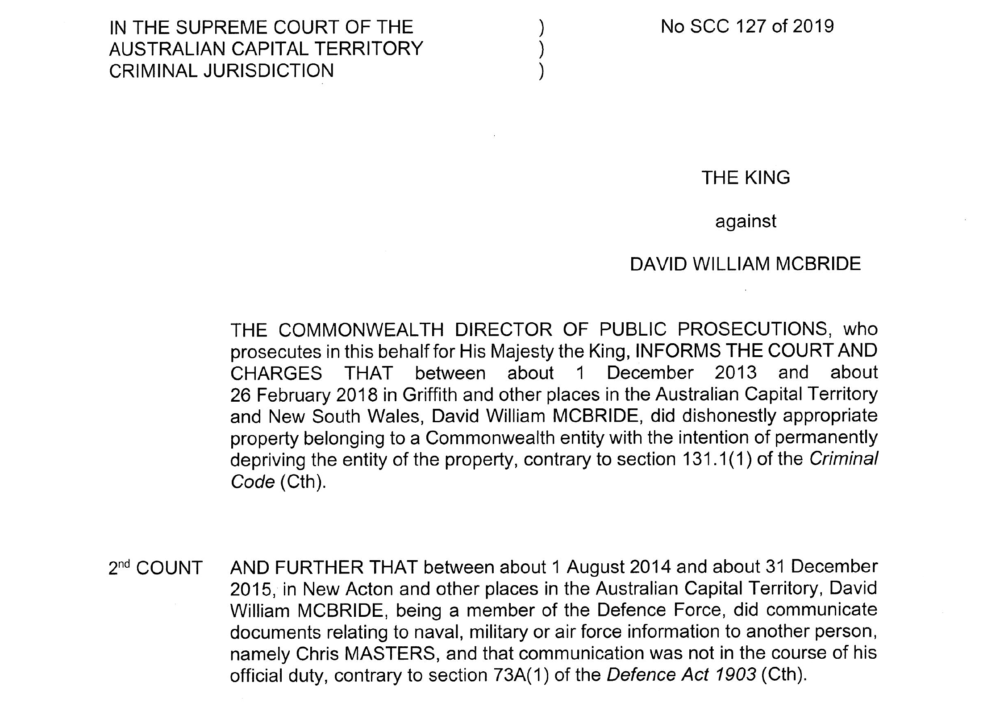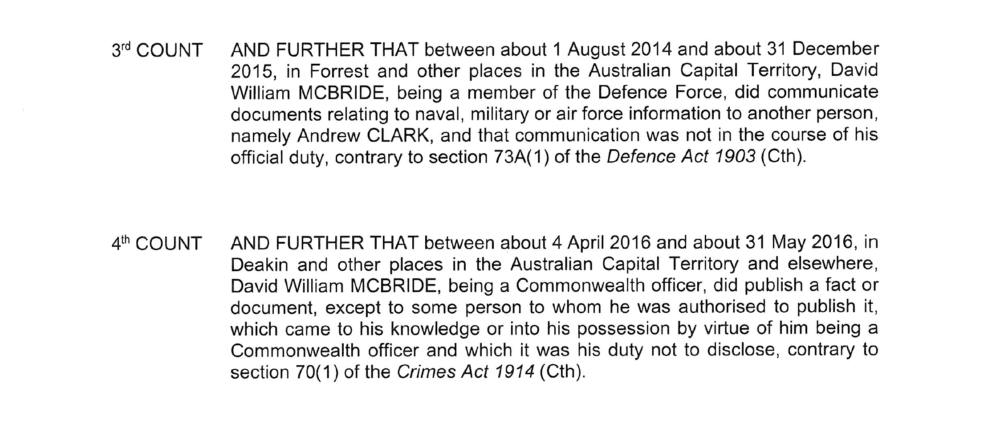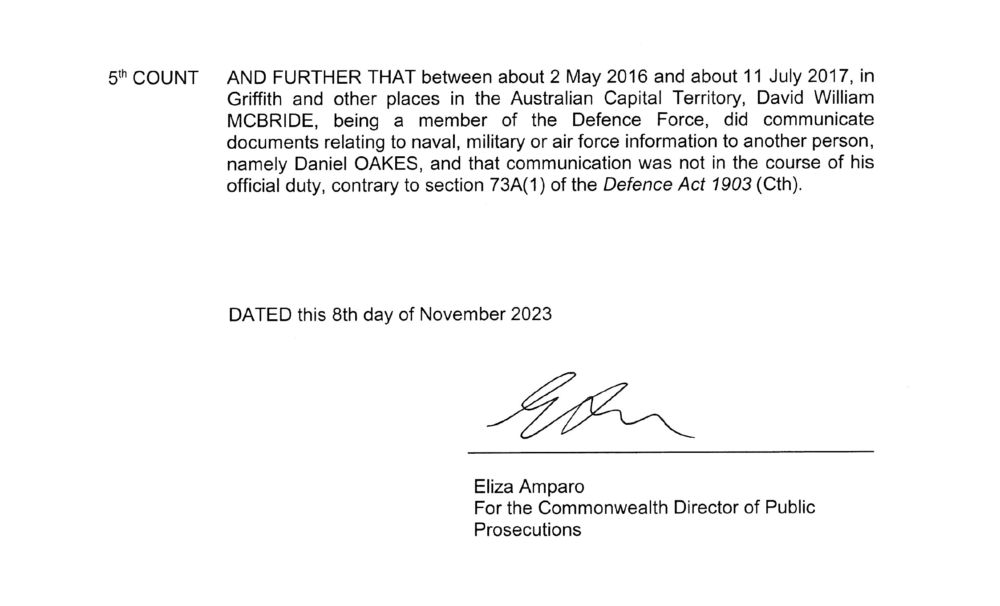Whistleblower David McBride’s lawyers argued on Day One of his trial that a soldier’s duty is not just to follow his superior’s orders, but to serve the entire nation. Joe Lauria reports.
By Joe Lauria
in Canberra, Australia
Special to Consortium News
The trial of Australian whistleblower David McBride opened on Monday, with the prosecution and the defence sketching out their cases before Justice David Mossop at the Supreme Court in Canberra.
McBride, who served two terms in Afghanistan as a lawyer with the Australian Defence Force (ADF), has been charged in a five count indictment for a trial that is expected to last three weeks.
The prosecution argued on Monday that McBride broke laws of military discipline by leaking to the Australian media. McBride’s lawyers conceded in court that he indeed broke such regulations but that he had a duty to the nation that superseded military discipline.
The trial is shaping up to be a battle between distinct ideas of the military’s role in society: is it to serve the entire community’s interests or is it a law unto itself?
In 2014 McBride made internal allegations after learning of murders of Afghan civilians by Australian soldiers. McBride then began leaking evidence to the Australian Broadcasting Corporation, the national broadcaster, between 2014 and 2016.
Australian Major General Justice Paul Brereton began an investigation in May 2016 and made public findings in November 2020 that pointed to “credible information” about Australian war crimes. The Brereton report accused Australian special forces of murdering 39 unarmed Afghans.
Nevertheless, in September 2018 McBride was charged with allegedly stealing government property in violation of the Criminal Code Act 1995. In March 2019 he was charged with three more alleged crimes in breach of the Defence Act 1903 as well as “unlawfully disclosing a government document” contrary, allegedly, to the Crimes Act 1914.
‘Who Do You Serve?’
McBride entered the Supreme Court Monday on morning with his therapy dog Jake, whom he was allowed to bring into court. He encountered a large crowd of supporters rallying in front of the courthouse. “Today I serve my country,” he told his backers. “The question I have for you, Anthony Albanese, is who do you serve?”
Special Counsel Trish McDonald, who lead the government’s team of prosecutors, began the day by laying out the military laws she claims McBride violated. McDonald said the concept of duty in the law says it is not in public interest to reveal classified information to the public.
McBride’s primary duty, she said, was to follow orders. The accused was a legal officer, she asserted. He was not appointed to inform the press. He contravened his official duty. In fact, there is a public interest in non-disclosure, the prosecutor argued.
All defence personnel are required to comply with a “general order” – which includes a “defence instruction” – meaning official information must be treated as confidential and not disclosed to non defence entities, McDonald told the court.
McBride had neither authority nor permission to disclose the information to the media. To do so was not in accordance with McBride’s duty, the prosecutor said. Public release of such information must be approved by the attorney general, she said.
Obedience to command is essential to an effective defense force, the Crown prosecutor said, and disobedience is “disruptive.”
Keeping confidentiality is critical to an ADF lawyer, McDonald further argued and a core duty of a member of the armed forces is obedience to orders.
There is no such “free standing duty” imposed on members of the ADF to advance the public interest contrary to lawful orders, McDonald told the court. “The notion that an ADF member can contravene the law because they believed subjectively that revealing confidential information is in the pubic interest is inimical to discipline in the ADF,” she said.
The oath a soldier takes does not allow an ADF member to disobey it because he believes that to do so advances the public interest,” McDonald argued. Was the accused allowed to act in the public interest regardless of orders? she asked the court.
The ABC broadcast a report in 2017 about the murder of innocent Afghans based on evidence supplied by McBride and a second whistleblower. On June 5, 2019 the Australian Federal Police raided the ABC’s Sydney headquarters for eight hours and removed files.
The attorney general ultimately decided against prosecuting an ABC journalist, Dan Oakes, who had worked on the Afghan Files story. In March, three years after the Brereton report, the first soldier was charged with murder.
In court on Monday, McDonald pointed out the failure of the ABC’s challenge to the AFP’s search warrant of a media office.
A Duty Beyond the Military
Citing case law, the defense methodically laid out the difference between military discipline regulations and civilian criminal law, arguing that McBride had a duty not just to the military that he served but also to the country.
Special Counsel Stephen Odgers, the lead barrister for the defence, argued that an ADF soldier takes an oath to the King, whose duty is to uphold the interests of the nation. Therefore it follows logically that a soldier’s duty is not just to the military but to the interests of society as a whole.
“Duty of service to the sovereign should be understood as a duty to serve the public even if it conflicts with an order of the Defence Tribunal,” Odgers said.
While McBride may have violated the military code he has not violated civil, criminal law, Odgers argued. The former should be determined by military tribunals, he said, and McBride should not be tried in a civil court.
“We don’t accept that following the oath necessarily means following orders,” Odgers told the court. “There isn’t always such an obligation.”
And that it is up to a jury, and not the military, to determine, he argued.
Only a jury can decide that it was acceptable for McBride to “expose criminality within the ADF to prevent future offences.”
“There is also a duty to disobey unlawful orders under Section 45 of the Defence Act,” Odgers added. “The accused had a duty to the administration of justice.”
The trial continues on Tuesday morning here when the defense will introduce a classified document that testifies to the commission of serious crimes, an example of the circumstances in which McBride’s duty as a lawyer was not to obey orders to maintain confidentiality but, to disclose those crimes.
Joe Lauria is editor-in-chief of Consortium News and a former U.N. correspondent for The Wall Street Journal, Boston Globe, and numerous other newspapers, including The Montreal Gazette, the London Daily Mail and The Star of Johannesburg. He was an investigative reporter for the Sunday Times of London, a financial reporter for Bloomberg News and began his professional work as a 19-year old stringer for The New York Times. He is the author of two books, A Political Odyssey, with Sen. Mike Gravel, foreword by Daniel Ellsberg; and How I Lost By Hillary Clinton, foreword by Julian Assange. He can be reached at [email protected] and followed on Twitter @unjoe






Nice, I like it, “a soldier’s duty is not just to follow his superior’s orders, but to serve the entire nation…” though, I hope one day people will say “… a person duty is not to follow a nation, but to serve the entire humanity.” That would be what McBride did and that would set in motion a new generation of people which judge a nation’s actions frees from the clutches of unhealthy nationalism, religion and ideology
Didn’t George Bush do the same thing? Bombing Iraq in the morning and killing many with no reason—except perhaps for GW to land on an aircraft carrier with his flight suit on and declare,” Mission Accomplished.”
So wrong , so wrong—and how many did yo kill that early morning day. Mr Bush?
I’m sorry Australian military—-you’ve earned the Bush Award—-walk around like a happy rooster,—just like you won a war– but what you did was to lose your trust to Americans and the world..
How can we trust a government that puts loyalty to the evil committed by that government above obviously moral principles?
In the military soldiers are encouraged to lay down their lives for their country. So I understand it when they make great personal sacrifices for the public good.
Seems the politicos in the West are more concerned with adhering to imperialist hegemony than their own laws. The end of its reign cannot be far off.
So, about the post WW II Nuremberg tribunals decisions and the ensuing executions, is it time to apologize to the descendants of the defendants or to apply the purported universal principles on which such decisions were based?
Evidence of “Just Following Orders” was dismissed the”The Nuremberg Trials”, and remains glorified in Australian rhetorical history as Justice. The Afghanistan 20 years of slaughter need be justified by the 2023 Govt of Australia judicial system as just following orders, which remains to this day, “Do What The UK/USA says!”. Cant be seen as treasonous to the Flags of Empire emblazoned into the top of the AUS flag now can we.
Absolute obedience and unquestioning loyalty to the military chain of command are far more dangerous to the nation than leaking secrets.
Thank you for covering this case CN. This case highlights (again), the debate about laws, rules, oaths, and when to act on ones own sense of principle and what is right – questions critical to our times.
The first problem is taking an oath to the King. Australia still exists as a colony of the United Kingdom, which still maintains a medieval monarchy. Down with all monarchy! David McBride did the right thing.